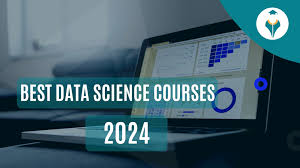In 2024, data science continues to be a field with immense potential and opportunity. As businesses and industries increasingly rely on data to drive decisions, the demand for skilled data scientists is at an all-time high. Whether you’re looking to break into the field or advance your career, there’s no shortage of online courses designed to equip you with the skills needed for success. This guide highlights the best online courses for learning data science in 2024, covering various platforms, specializations, and learning paths to help you make an informed decision.
1. Introduction to Data Science
Data science is an interdisciplinary field that uses scientific methods, processes, algorithms, and systems to extract knowledge and insights from structured and unstructured data. The field combines expertise in statistics, programming, and domain knowledge to solve complex problems and support decision-making processes. With the rapid advancement of technology, the landscape of data science is continually evolving, making it crucial for learners to stay updated with the latest tools and techniques.
2. Top Online Courses for Data Science in 2024

1. Data Science Specialization by Johns Hopkins University (Coursera)
Overview: This specialization is a comprehensive introduction to data science and covers a wide range of topics, including R programming, data cleaning, and statistical inference. It’s a great choice for beginners who want a structured approach to learning.
Key Features:
- Instructor: Johns Hopkins University faculty
- Content: Includes 10 courses and a capstone project
- Skills Covered: R programming, data manipulation, exploratory data analysis, machine learning
- Duration: Approximately 11 months
Why It’s Great: The specialization provides a hands-on approach with real-world projects and practical exercises, making it ideal for learners who want to build a solid foundation in data science.
2. Data Science MicroMasters by UC San Diego (edX)
Overview: The Data Science MicroMasters program from UC San Diego offers an in-depth exploration of data science concepts, with a focus on practical applications and advanced techniques. It’s designed for individuals who want to gain a deeper understanding of data science and its applications.
Key Features:
- Instructor: UC San Diego faculty
- Content: 4 courses and a capstone project
- Skills Covered: Data analysis, machine learning, big data, data visualization
- Duration: 9-12 months
Why It’s Great: This program provides a more advanced and comprehensive learning experience, making it suitable for those who already have some background in data science and want to deepen their knowledge.
3. Applied Data Science with Python Specialization by the University of Michigan (Coursera)
Overview: This specialization focuses on using Python for data science tasks and includes practical projects that involve real-world datasets. It’s a great choice for learners who want to develop their Python programming skills while working on data science applications.
Key Features:
- Instructor: University of Michigan faculty
- Content: 5 courses and a capstone project
- Skills Covered: Python programming, data visualization, machine learning, text analysis
- Duration: Approximately 5 months
Why It’s Great: The specialization emphasizes hands-on learning and practical applications, making it ideal for learners who prefer to work on real-world problems using Python.
4. Data Science and Machine Learning Bootcamp with R (Udemy)
Overview: This bootcamp is designed for those who want to quickly gain practical skills in data science and machine learning using R. It covers essential topics and provides hands-on exercises to reinforce learning.
Key Features:
- Instructor: Jose Portilla
- Content: 30+ hours of video content, practical exercises, and projects
- Skills Covered: R programming, data visualization, machine learning, statistical analysis
- Duration: Self-paced
Why It’s Great: The bootcamp offers a fast-paced, practical approach to learning data science with R, making it suitable for those who want to gain skills quickly and apply them immediately.
5. Data Science for Everyone by IBM (Coursera)
Overview: This course provides an overview of data science concepts and is designed for individuals who are new to the field. It covers the basics of data science, including the tools and techniques used by data scientists.
Key Features:
- Instructor: IBM Data Science experts
- Content: 4 modules
- Skills Covered: Data science fundamentals, data visualization, data analysis, basic machine learning concepts
- Duration: Approximately 4 weeks
Why It’s Great: The course is ideal for beginners who want to gain a foundational understanding of data science without committing to a lengthy program.
6. Data Science with SQL and Python (Pluralsight)
Overview: This course focuses on using SQL and Python for data science tasks, covering key concepts and techniques for data manipulation and analysis. It’s designed for learners who want to integrate SQL skills with Python programming.
Key Features:
- Instructor: Various industry experts
- Content: Video lessons and hands-on exercises
- Skills Covered: SQL querying, Python programming, data analysis, data visualization
- Duration: Self-paced
Why It’s Great: The course provides practical skills for working with databases and data analysis using both SQL and Python, making it ideal for learners interested in data management and analysis.
3. Choosing the Right Course for You
When selecting a data science course, consider the following factors to ensure it aligns with your goals and learning style:
1. Learning Objectives
Determine what you want to achieve with the course. Are you looking to gain a foundational understanding, advance your existing knowledge, or specialize in a particular area of data science?
2. Prerequisites
Check if the course has any prerequisites. Some courses require prior knowledge of programming or statistics, while others are designed for beginners.
3. Course Format
Consider your preferred learning format. Do you prefer structured courses with a set schedule or self-paced learning? Look for courses that fit your schedule and learning style.
4. Instructor Expertise
Research the instructors and their backgrounds. Courses taught by industry experts or renowned institutions often provide higher-quality content and valuable insights.
5. Reviews and Ratings
Read reviews and ratings from previous learners to gauge the course’s effectiveness and relevance. Feedback from other students can provide valuable insights into the course’s quality and content.
4. Additional Resources for Data Science Learning

In addition to online courses, consider exploring the following resources to enhance your data science skills:
- Books: Books such as “Data Science for Business” by Provost and Fawcett and “Python Data Science Handbook” by VanderPlas provide in-depth knowledge and practical examples.
- Online Communities: Engage with online communities like Reddit’s r/datascience or Stack Overflow to ask questions, share knowledge, and stay updated on industry trends.
- Project Work: Apply your skills by working on real-world projects or participating in data science competitions on platforms like Kaggle.
- Blogs and Podcasts: Follow data science blogs and podcasts to stay informed about the latest developments, tools, and techniques in the field.
5. Conclusion
As the field of data science continues to grow and evolve, the availability of high-quality online courses makes it easier than ever to gain the skills needed for a successful career. Whether you’re a beginner looking to get started or an experienced professional seeking to enhance your expertise, the courses listed above offer valuable learning opportunities for 2024. By choosing the right course and utilizing additional resources, you can build a strong foundation in data science and position yourself for success in this dynamic and rewarding field.


